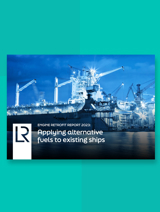To mark the official launch of the Maritime Decarbonisation Hub, Lloyd’s Register asked artist Reuben Dangoor to reimagine great maritime artworks for a zero-carbon future. In our virtual exhibition, paintings by Turner, Van Gogh, Monet and Tingqua are exhibited side-by-side with their zero-carbon interpretations, highlighting the pathways to a zero-carbon future for the maritime industry.
In 2016, the UN’s Paris Agreement on climate change set the world on a course of reducing global warming, with a pact between almost 200 nations to implement measures designed to limit global warming this century to 2°C, and while aiming for 1.5°C.
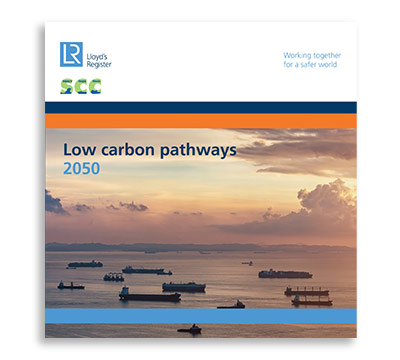 From that point on, Lloyd’s Register redoubled its efforts to bring about the reduction of greenhouse gas emissions in the shipping sector. Lloyd's Register was already a partner in Shipping in Changing Climates, an early research project into low-carbon solutions for shipping supply chains, creating new knowledge and tools to help the industry tackle this global climate challenge.
From that point on, Lloyd’s Register redoubled its efforts to bring about the reduction of greenhouse gas emissions in the shipping sector. Lloyd's Register was already a partner in Shipping in Changing Climates, an early research project into low-carbon solutions for shipping supply chains, creating new knowledge and tools to help the industry tackle this global climate challenge.
The first key research report was Low Carbon Pathways 2050. Published in 2016, the report asked the question: ‘Given the best available evidence, what is a reasonable estimate of how shipping might be required to change and what could this change look like?’ The study showed the industry it needed to advance thinking beyond marginal gains in energy efficiency, to identify the least-cost decarbonisation pathways. The analysis underlined the need for shipping to begin decarbonisation imminently. The later decarbonisation was left, the more rapid, costly and potentially disruptive it would be.
The importance of zero-emission vessels
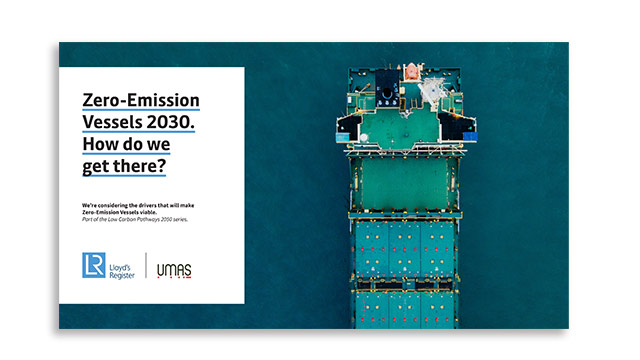
Further research by Lloyd’s Register, in collaboration with University Maritime Advisory Services (UMAS), showed the importance of zero-emission vessels (ZEVs) entering the global shipping fleet. To meet the demands of the Paris Agreement, it was found shipping would need to reduce its carbon emissions by at least 50%. And to achieve that target, large, deep-sea zero-emissions vessels would need to be in the water by 2030, and form a significant portion of new-builds from then on. Lloyd's Register’s 2017 report Zero-emission vessels 2030 demonstrated the viability of ZEVs and identified what is needed to make them a competitive solution. The study looked at seven fuel and technology options for ZEVs, and applied those options to five different ship types, across three different regulatory and economic scenarios. The report concluded that anyone planning to finance, design or build a ship in the 2020s must consider how it would switch to a non-fossil fuel later in its operational life.
Regulatory ambitions add momentum
In April 2018, the International Maritime Organization's (IMO) Marine Environment Protection Committee adopted its initial greenhouse gas reduction strategy. This set a significant ambition for the shipping sector; to reduce greenhouse gases by at least 50% by 2050, based on a 2008 baseline. It went further, stretching the ambition to a 100% reduction by 2050 if shown to be possible. This would put the shipping sector on course for a 2°C pathway, while aiming for 1.5°C, in line with the Paris Agreement and with our Low Carbon Pathways 2050 report.
Further Lloyd’s Register research evaluated potential solutions
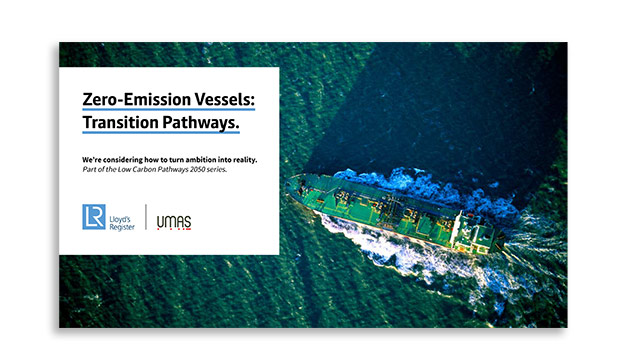 In the Zero-emission vessels: Transition pathways study of 2019, Lloyd’s Register in collaboration with UMAS set out to understand the milestones and enablers required to create the necessary conditions for decarbonisation. A range of technological pathways were identified, all of which could take shipping to a zero-carbon future. The report considered how cost, operating profile and policy measures influenced the routes, and identified milestones over time with regards to safety, technical, social, economic and environmental aspects of potential ZEVs and the associated supply chain.
In the Zero-emission vessels: Transition pathways study of 2019, Lloyd’s Register in collaboration with UMAS set out to understand the milestones and enablers required to create the necessary conditions for decarbonisation. A range of technological pathways were identified, all of which could take shipping to a zero-carbon future. The report considered how cost, operating profile and policy measures influenced the routes, and identified milestones over time with regards to safety, technical, social, economic and environmental aspects of potential ZEVs and the associated supply chain.
The report showed that significant investment would be required in the short-term, and action in the form of policy, regulations and financial incentives would be required. The findings were later used by the Global Maritime Forum’s ‘Getting to Zero Coalition’ to frame their ambition statement for the acceleration of decarbonisation. Lloyd's Register is a founding partner of the Getting to Zero Coalition.
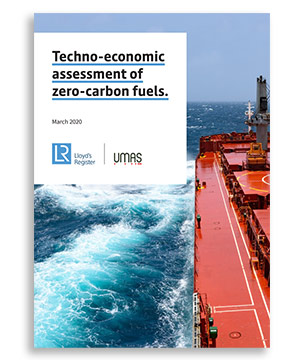 Over time, research by Lloyd’s Register has continued to develop the evidence base for the evolution of shipping. The thinking in Zero-emission vessels: Transition pathways was further updated given new evidence as the wider energy system evolved, in a report in 2020 called Techno-economic assessment of zero carbon fuels. This assessed the zero-carbon options through the lens of investment readiness, technology readiness and community readiness. The analysis showed that although certain pathways look more resilient than others from the perspective of asset longevity, fuel price is the main factor. The study concluded that the relative competitiveness of different zero-carbon energy sources will vary through future decades, and that there is not a single over-riding fuel solution that is consistently the most economically viable through to 2050. It showed that flexibility is key to ensuring resilience.
Over time, research by Lloyd’s Register has continued to develop the evidence base for the evolution of shipping. The thinking in Zero-emission vessels: Transition pathways was further updated given new evidence as the wider energy system evolved, in a report in 2020 called Techno-economic assessment of zero carbon fuels. This assessed the zero-carbon options through the lens of investment readiness, technology readiness and community readiness. The analysis showed that although certain pathways look more resilient than others from the perspective of asset longevity, fuel price is the main factor. The study concluded that the relative competitiveness of different zero-carbon energy sources will vary through future decades, and that there is not a single over-riding fuel solution that is consistently the most economically viable through to 2050. It showed that flexibility is key to ensuring resilience.
Turning words into action
Since the IMO announced its ambition in 2018, the decarbonisation debate has come to dominate many industry and societal conversations. Lloyd’s Register’s evidence-based research is now being used across the shipping sector to underpin projects and initiatives addressing different aspects of the challenge.
However, industry momentum has not translated into action. Stakeholders need to build and implement a transition strategy and have confidence to act. There is a consensus that an acceleration in strategy, greater transparency and cross-industry collaboration are needed. There must be pilot solutions to show what is possible, with learning shared to encourage adoption at scale.
The Lloyd’s Register Maritime Decarbonisation Hub is formed
The evidence is clear that the 2020s must be the decade of action on decarbonisation in shipping. So, in 2020 Lloyd’s Register Group and Lloyd’s Register Foundation created the Lloyd’s Register Maritime Decarbonisation Hub, which will provide leadership, knowledge and safe technical routes to the adoption of zero carbon solutions in shipping.
Frequently asked questions about decarbonisation
The Lloyd’s Register Maritime Decarbonisation Hub will provide the leadership, collaboration and evidence needed to shape safe and sustainable pathways to the decarbonisation of the shipping industry.
Decarbonisation as a general term refers to the reduction and control of manmade greenhouse gas (GHG) emissions. GHG emissions from shipping are a consequence of the carbon intensity of shipping’s energy supply, the energy efficiency of shipping, and the demand for shipping.
Shipping, as an industry, is currently dependent on fossil-based fuels for propulsion, therefore decarbonisation is a transformation away from fossil-based fuels to zero-carbon energy sources. This requires the development of a fleet of ships that derive their energy consumption from zero-carbon energy sources, and the development of supply chains that can deliver those zero-carbon energy sources at sufficient volume and in sufficient locations.
The shipping industry needs leadership, collaboration and evidence-based direction to achieve its decarbonisation goals. The Maritime Decarbonisation Hub will create and share evidence, insight and knowledge about the transition to a decarbonised world fleet.
The Hub will work in partnership with other forward-looking organisations to deliver credible thought leadership to the entire industry - regulators, policy makers, investors, owners, operators and charterers and customers. It will demonstrate the costs, benefits, opportunities and risks of potential pathways to decarbonise.
We will lead the industry by:
- Identifying the pathways to a decarbonised sector
- Shifting the narrative by creating independent thought leadership and collaborating in key industry forums
- Influencing policy and guiding regulation with advice on the efficacy of potential measures, and the practicality of their implementation
- Reaching across the supply chain to provide end-to-end assurance for zero-carbon fuels, at scale, in the right locations and delivered safely
We will create practical solutions, such as:
- Building pilots and prototypes to establish practical knowledge based on the real-world application of technology and the mitigation of risk
- Creating new tools to help all stakeholders understand the future implications of today’s business decisions
- Applying our knowledge to ships in service and supporting a growing range of shipping organisations
The Hub will not take a ‘one size fits all’ approach to zero-carbon energy sources. Instead, it will provide the evidence needed by the relevant decision-makers in the shipping industry to transition with regulatory, economic and societal considerations.
Yes. As one of the world’s leading shipping classification societies, Lloyd’s Register prides itself on giving expert, independent opinion, free from outside influence. Our existing body of research into decarbonisation demonstrates that autonomy, which will continue in the work of the Lloyd’s Register Maritime Decarbonisation Hub.
The Hub will be overseen by a Stakeholder Panel of representatives from the shipping industry, who will shape the strategy of the Hub, with a Governance Board of representatives from Lloyd’s Register and Lloyd’s Register Foundation. The Hub’s governance system will produce regular reports about its work and outcomes, to maintain transparency and independence.
As one of the world’s leading classification societies, Lloyd’s Register prides itself on providing expert, independent opinion, free from outside influence. Our existing body of evidence-based research into decarbonisation demonstrates that autonomy, which will continue in the work of the Lloyd’s Register Maritime Decarbonisation Hub.
The Hub is a ring-fenced and recognisable team within the Lloyd’s Register Marine & Offshore business stream, reporting into a Programme Manager who is accountable for ensuring that plans and activities are managed and reported to the Hub’s Governance Board.
That Governance Board will consist of subject matter experts from Lloyd’s Register Group, Lloyd’s Register Foundation and strategic industry partners. The Hub will produce regular reports about its work, in order to maintain transparency and independence.





